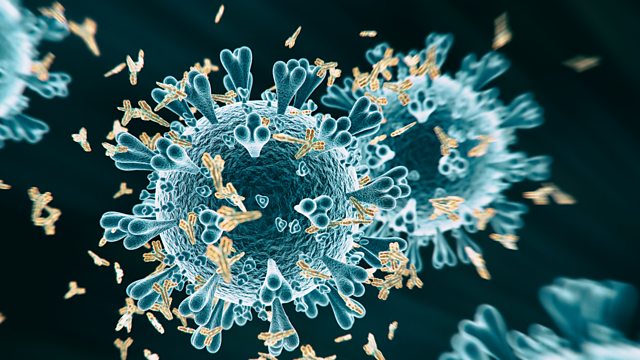How long do Covid-19 antibodies last?
New research on how well our immune system defends us from the coronavirus. Also, a novel Covid-19 vaccine passes its first test.
Science in Action looks at some of the latest research on how response of our immune system to infection by the coronavirus. Researchers at Kings College London find that protective antibodies appear to fade away after about three months following infection whereas a team at the Karolinska Institute has discovered that although antibodies may decline, other important players called T cells in our defences do not. Dr’s Katie Doores and Marcus Buggert talk about the implications of these discoveries for the quest for a vaccine against the coronavirus.
Roland Pease also talks to Dr Barney Graham of the National Institute of Allergy and Infectious Diseases in the United States about the results from the Phase 1 trial of novel type of vaccine against the virus. NIAID have partnered with biotech company Moderna to produce the first mRNA vaccine in the Institute’s pandemic preparedness program.
Biologist Dr Sonja Wild tells Roland about the remarkable fishing strategy devised by dolphins in Shark Bay, Australia. They chase fish into the empty shell of giant sea snails, then take the shells to the surface and tip the fish into their mouths. Dr Wild’s 7 years of research has revealed how the dolphins have learned to do this.
Think of the oceans and an empty and peaceful expanse relatively untouched by humankind might come to mind. But is this peace an illusion? CrowdScience listener Dani wants to know if the noise of shipping and other human activity on the oceans is impacting on sea life.
To find out, Marnie Chesterton takes a deep dive to learn how marine animals have evolved to use sound; from navigating their environments to finding a mate or hiding from prey. She then speaks to a scientist who is using acoustic observatories to track the many ways human activity - like sonar and shipping – can interfere.
Marnie virtually visits a German lab which tests the ears of beached whales, dolphins and seals from around the world to try and ascertain whether they suffered hearing damage, and what might have caused it. What other smaller creatures are negatively impacted by underwater noise? Marnie learns that acoustic trauma is more widespread than first thought.
As human life continues to expand along ocean waters, what is being done to reduce the impact of sound? Marnie meets some of the designers at the forefront of naval architecture to see how ship design, from propellers to air bubbles and even wind powered vessels can contribute to reducing the racket in the oceans.
Main image: Abs COVID-19 antibody - Viral Infection concept. Credit: Getty Images
Last on
Broadcasts
- Sat 18 Jul 2020 23:06GMTΒι¶ΉΤΌΕΔ World Service
- Sun 19 Jul 2020 15:06GMTΒι¶ΉΤΌΕΔ World Service News Internet
Podcast
-
![]()
Unexpected Elements
The news you know, the science you don't


